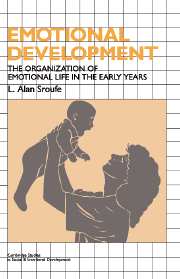Book contents
- Frontmatter
- Contents
- Preface
- Part I The nature of emotional development
- Part II The unfolding of the emotions
- 4 An organizational perspective on the emergence of emotions
- 5 The development of joy: a prototype for the study of emotion
- 6 The development of fear: further illustration of the organizational viewpoint
- 7 The interdependence of affect and cognition
- 8 Meaning, evaluation, and emotion
- Part III Emotional development and individual adaptation
- References
- Index
7 - The interdependence of affect and cognition
Published online by Cambridge University Press: 16 September 2009
- Frontmatter
- Contents
- Preface
- Part I The nature of emotional development
- Part II The unfolding of the emotions
- 4 An organizational perspective on the emergence of emotions
- 5 The development of joy: a prototype for the study of emotion
- 6 The development of fear: further illustration of the organizational viewpoint
- 7 The interdependence of affect and cognition
- 8 Meaning, evaluation, and emotion
- Part III Emotional development and individual adaptation
- References
- Index
Summary
Knowing is inherent in feeling.
Kellerman (1983)Throughout this book intimate ties between affect and cognition are apparent, both as we consider the unfolding of the emotions and as we examine the child's developing ability to control and modulate emotion. This could not be otherwise. Affect and cognition are mutually influencing, two aspects of the same process. While appraisal of an event may be necessary for the activation of emotion, events achieve significance when amplified by affect (Lichtenberg, 1989). As Piaget and Inhelder (1969) put it:
There is no behavior pattern, however intellectual, which does not involve affective factors as motives; but, reciprocally, there can be no affective states without the intervention of perceptions or comprehensions which constitute their cognitive structure. Behavior is therefore of a piece, even if the structures do not explain its energetics and if, vice versa, its energetics do not account for its structures. The two aspects, affective and cognitive, are at the same time inseparable and irreducible. (p. 158)
In a paper devoted to the relation between “affectivity and intelligence,” Piaget (1962) made the point that there “is no such thing as a purely cognitive state … There are no acts of intelligence, even of practical intelligence, without interest at the point of departure and affective regulation during the entire course of an action, without joy at success or sorrow at failure” (p. 130).
- Type
- Chapter
- Information
- Emotional DevelopmentThe Organization of Emotional Life in the Early Years, pp. 117 - 130Publisher: Cambridge University PressPrint publication year: 1996

